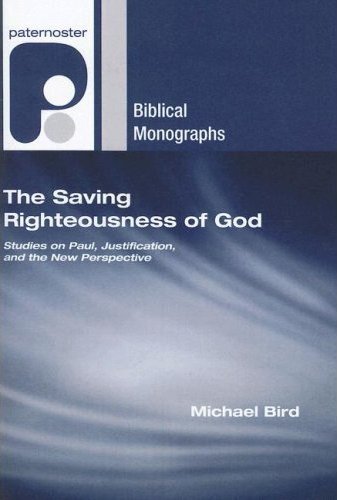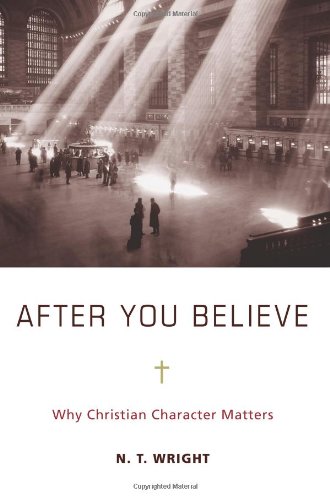
Somehow, over the past month or so, four different books on Christian spirituality found their way into my hands. It isn’t that unusual for me to read that sort of thing, but it is strange that I would read four almost back-to-back so narrowly focused on one particular issue. The question that each was answering in their own way is “What does it mean to be a Christian?” Now you might think that it shouldn’t take me four different books to help me answer this question. Doesn’t there come a time when one doesn’t have to read any more books about it? I’ve been involved in ministry for nearly twenty years now. So haven’t I figured it out yet?
I suppose as the answer is both ‘yes’ and ‘no.’ I certainly have some convictions about what the Christian life is suppose to look like, but I don’t have all the answers. And each of these four books challenges me to look with fresh eyes at things that may have been previously ignored concerning the journey of faith.
While each brings a unique perspective, all four writers agree on at least one thing… that being a Christ-follower is about more than being able to check off the “I prayed the prayer” box. You may not be familiar with this sort of Christian spirituality, but it basically says that once people pray the “sinner’s prayer,” they have arrived. God has no further work to accomplish in an individual’s life. He or she is now “saved.”
Not that any of the writers are against that sort of thing. They probably even think that praying that kind of prayer is a fine sort of thing to do. And yet, each was very clear to affirm that the Christian life is certainly about more than that. Much more.
So in an effort to turn this into a post that is actually helpful, I’ll offer up a few words about each book.
 Radical: Taking Back Your Faith from the American Dream
Radical: Taking Back Your Faith from the American Dream
by David Platt
(sample chapter)
I would largely agree with what my good friend Bobby had to say about it, so I’ll be brief.
The sub-title says it well. This book is meant to wake the church up to the reality that the version of Christianity that much of the West has bought into looks a whole lot more like the American Dream than Jesus. Perhaps you are familiar with the phrase “to comfort the afflicted and afflict the comfortable.” This book does the second half very well.
If you were to ask the average Christian sitting in a worship service on Sunday morning to summarize the message of Christianity, you would most likely hear something along the lines of ‘the message of Christianity is that God loves me.’ Or someone might say, ‘The messages of Christianity is that God loves me enough to send his Son, Jesus, to die for me.’ … ‘God loves me’ is not the essence of biblical Christianity. Because if ‘God loves me’ is the message of Christianity, then who is the object of Christianity? … Me.
 Follow: A Simple and Profound Call to Live Like Jesus
Follow: A Simple and Profound Call to Live Like Jesus
by Floyd McClung
(sample chapter)
This book’s sub-title is half true. This is a clear cut, no nonsense approach to one’s life with Christ. After reading a sentence or chapter, no one is in any way left scratching there head saying, “I wonder what he meant by that?” McClung says what he means and means what he says. I would put this in the hands of anyone who has recently begun their journey with Christ, has an earnest desire to grow, and wants some handles on moving forward.
While long on simplicity, I feel like it comes up short on profundity. This book is so clear and certain, that I think it doesn’t do justice to the mystery and wonder of who God is. While I would whole-heartedly affirm that God is a God of order, I would as strongly argue that life with God can’t be reduced to formulas or bullet-points. I in no way think that the author believes that it can. I do think he has succeeded in making the complicated accessible. And that’s a good thing. Sometimes.
So this is our choice: Either we model ourselves on gods of our own making, or we allow God to mold us into His image, the very model of which is Jesus. Which will it be for you?
 One.Life: Jesus Calls, We Follow
One.Life: Jesus Calls, We Follow
by Scot McKnight
(sample chapter)
I meet with a group of men on Monday mornings, and this is the one we are working through right now. These guys more or less trust me. So when I suggested we read and discuss it, no one balked. That is until they got to the first chapter. It was all about chasing after our dreams, and I could tell that they were inwardly rolling their eyes. For a couple, their outward expressions matched their inner feelings. “Really, we’re going to talk about our dreams? That’s original. Doesn’t nearly every book on Christian spirituality sound that same tired note.”
However, I had the benefit of having read the entire book. And what I knew was that McKnight’s re-look at the Christian life is broader in scope than the others I had recently read. There are fewer stones left unturned. And as this book seeks to expand one’s understanding of who Jesus is and what it means to follow him, it lends itself well to discussion. Not just discussion of the ideas, but the way in which our lives intersect the issues being raised. We’ll see.
When I hear Christians describe the Christian life as little more than soul development and personal intimacy with God, and I do hear this often, I have to wonder if Christians even read their Bibles.
Ouch.
 Transforming Conversion: Rethinking the Language and Contours of Christian Initiation
Transforming Conversion: Rethinking the Language and Contours of Christian Initiation
by Gordon T. Smith
(sample chapter)
I think it important to make a habit of reading a book’s sub-title. They not only tell you what the book is really about, but also give you a flavor of the book itself. As you might guess, this is of the nerdier variety. Several years ago, I read another book by Smith on conversion called Beginning Well. I had never read an entire book on the subject. So when I saw this one, I thought “What more could he have to say?” The answer… plenty. I would recommend it for anyone who wants (or needs) to think deeply about the nature of conversion. Another book title could have easily been Conversion: 301.
God’s salvation is always portrayed in corporate terms, never to the exclusion of the individual, but always with the assumption that the individual is an integral member of a community of faith. Thus we cannot in the end conceive of or portray a biblical doctrine of conversion except with a distinctly ecclesial character. Religious experience, in other words, is never purely individual, personal, and interior. It will (and must) be individual, personal, and interior, but it will never solely be individual and interior. Further, it will not be individual and personal and interior unless it is grounded in the common experience of the people of God, unless it has a corporate dimension. True Christian experience is anchored in the common faith of the church, and it is the common faith that gives authenticity to our personal and individual faith. It is the church’s ancient and historic experience that gives meaning to our personal experience.
Yeah. What he said.
I guess what I really want to say about these books is that any of them are worth reading. It all just depends on who you are and where you are in your understanding of what it means to follow Christ. And since I’m not “done” yet, I’ll keep seeking out books that help me understand that journey better.















